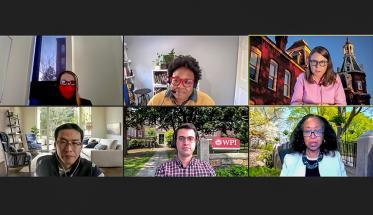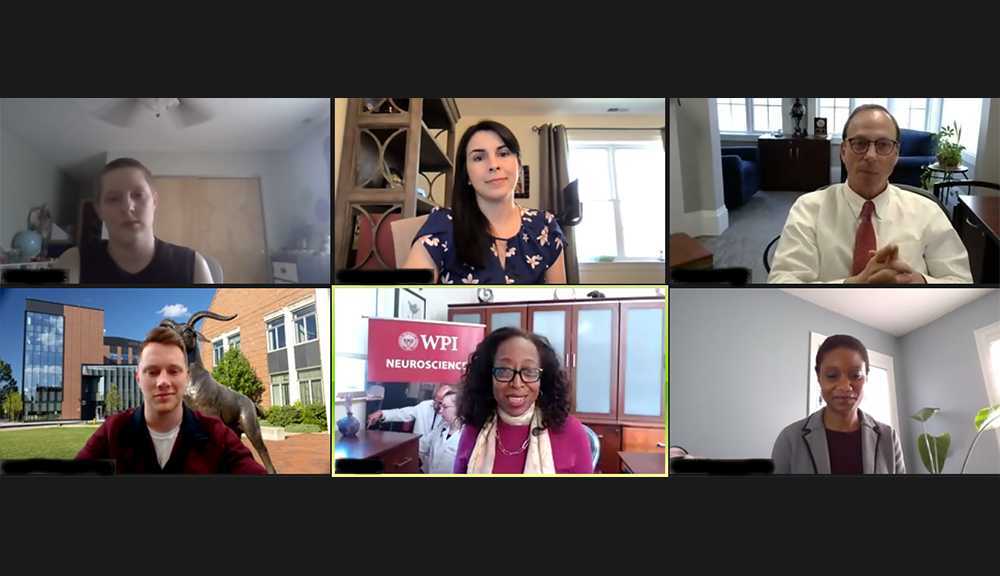Everyone has an opinion about social media, whether it’s about its merits, headaches, or even potentially dangerous consequences. The complexities of social media was the subject of the latest Critical Conversations series at WPI titled Social Media: The Good, The Bad, and The Ugly.
The conversation, held virtually via Zoom on Tuesday, March 9, and moderated by Jean King, Peterson Family Dean of the School of Arts & Sciences, included a multi-disciplinary panel of faculty and staff: Nima Kordzadeh, assistant professor, Foisie Business School; Carol Stimmel, adjunct instructor, Global School; Kyumin Lee, associate professor, Computer Science & Data Science; Adrienne Hall-Phillips, associate professor, Foisie Business School; and Lori Ostapowicz-Critz, associate director, Academic Strategy Library.
King noted that the idea of each conversation is to shed light on a topic for students, faculty, and staff to go deeper once the panel ends. “This is really an umbrella approach,” she said.
Impact of social media on society
In this latest conversation, panelists sought to answer the question “What impact does social media have on people and our larger society?” and spoke about topics such as fake news, deception, and social media’s influence on global communities and on consumer and personal behavior.
Stimmel kicked off the panel, saying that answering the question “what is social media?” does not go far enough, failing to “capture the transformative nature of social media.” While many people think about social media as a tool to create and share content, it can go so far as having a revolutionary impact on the world, noting the Arab Spring protests that resulted in several regime changes in the Middle East in the early 2010s, in which social media played a central organizing role. At the same time, social media companies are gathering personal data, and propaganda and hate speech flow through these same channels, she pointed out. Stimmel posited another question: How does social media define us? As individuals and communities?
From his expertise in computer science, Lee presented several countermeasures for handling misinformation shared on social media, including building a model that can automatically detect the probability of a post containing information that is valid or fake, as well as ways to support fact-checkers and users who may be too busy to check if information in a post is valid.
“There’s no doubt that misinformation—or fake news—has exploded across the social media platforms with serious implications,” Ostapowicz-Critz said. “Unfortunately, people often do not have sufficient skills or the tools to navigate the volumes and volumes of misinformation they’re going to encounter.” She spoke about what resources the WPI library offers students and how library staff strive to empower students by giving them fundamental skills and training needed to combat misinformation shared on social media. Students, she said, need to be able to assess the authority and expertise of sources and to be “savvy information seekers and lifelong learners.”
Social media and health care
Kordzadeh talked about the intersection of social media and health care, specifically, how misinformation surrounding the COVID-19 pandemic has spread on social media, including inaccurate advice about the disease, its prevention, and vaccinations. He cited one study that indicated false information is 70 percent more likely to be retweeted than the truth. “Humans are acting as misinformation engines, which is a problem,” he said.
Looking at how artificial intelligence and machine learning can help detect misinformation raises some philosophical and ethical questions, such as who should decide what information is true or false, and what types of speech should be allowed on social media. Answering a question from King, he noted that as humans we are always looking for information that confirms our beliefs. At the end of the day, he said, social media users should be mindful and think twice before sharing news online.
Being mindful of information sharing
“It’s our responsibility to make sure we’re using social media in the right way,” Hall-Phillips said, challenging us to think about how we use social media each day, and whether we’re using it for good or bad. “We owe it to ourselves to be a little bit more mindful about what type of information we are sharing,” she said, noting that something we share or retweet could be harmful to some population or could contain misinformation.
A positive of social media, she said, is that it can be a place for people to find and build community and a place to source solutions to a particular problem.
Winston Soboyejo, senior vice president and provost at WPI, shared his thoughts at the end of the conversation, saying that social media is an area rich with possibilities. He added that it’s been a “pleasure to be a fly on the wall and listen to the conversations we had and to be part of the critical conversations that are going on at WPI in areas that really require deep thought.”
The next Critical Conversations event will take place April 7 around the subject of student mental health. For more information about the series, visit https://www.wpi.edu/news/annual-events/critical-conversations.
-Melanie Thibeault




